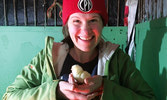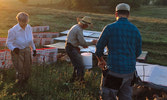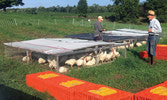Artisanal chicken program flourishing provincially, locally - Farm 2019
BY SHAWN LOUGHLIN
Now in its fourth year, the Chicken Farmers of Ontario (CFO) is continuing to see growth with its artisanal chicken program with plenty of local connections.
The program was first rolled out in 2015 and while there were 87 producers enrolled in the program in that first year, that number has since nearly doubled, now growing to close to 150 farmers.
Producers are spread throughout the province with program participants in the Windsor area in the west to the Ottawa region in the east and in the Rainy River district of Northern Ontario in the north.
The artisanal chicken program is aimed at focusing on the local consumer to meet the seasonal and differentiated demand for artisanal chicken and focus on growing safe, high-quality, nutritious chicken using traditional methods. It licences farmers to grow and market between 600 and 3,000 chickens.
Carl Stevenson of Blyth has worked on the program since its inception. He works with the producers, meeting with artisanal chicken farmers and has assisted in the development of an online resource for them. He also travels the province extensively speaking about the program.
Stevenson began his working career on the farm, but began working with CFO 12 years ago when he was looking for a change of scenary. Four years ago he transitioned into working with the artisanal program when it was created.
The program is really designed for caring farmers, Stevenson says, who will put in the time to create a value-added product with their chickens. They have to believe in what they’re producing, because they are largely responsible for finding their own markets.
It is aimed at farmers who are able to directly connect with consumers and take control of their own market, whether it be getting the word out about their product or selling directly to the consumer, the artisanal chicken program is designed for farmers who want to take a hands-on approach to their operation.
Both at the CFO level and at the grassroots level, Stevenson says, the program is about connecting with consumers and understanding what they want and how much they’re willing to pay for a premium product.
The birds raised through the artisanal program are traditionally larger birds than you would find in your average grocery store, Stevenson says. Most farmers raise the birds without the use of antibiotics. Many farmers also use non-genetically-modified or certified organic feed for their birds, although it is not a requirement of the program.
The farmers are then expected to raise the birds using traditional methods. Often the program is picked up by smaller, organic farms that market their chicken and other products directly to consumers, whether it be through farm-gate sales, online or at local farmers’ markets. They are also encouraged to sell to restaurants or local butcher shops, though, again, they have to find those markets on their own with ongoing support and guidance from CFO.
Many of those who have taken advantage of the program, Stevenson says, were already working marketing vegetables and other products straight to consumers, whether it be through farmers’ markets or the community-supported agriculture (CSA) model, so adding artisanal chicken to their product inventory made sense.
To ensure that the program and its producers stay on track, Stevenson says that all artisanal chicken farmers are audited annually against the “Raised by a Chicken Farmer On-Farm Food Safety and Animal Care Programs” standards, which are base on the National Farm Animal Care Council’s “Code of Practice for the Care and Handling of Chickens”.
While some of the producers have been the younger generation of farmers, coming up with organic farms and direct marketing, Stevenson says the program really has attracted producers of all ages and from diverse backgrounds. Many of the producers, he says, have taken up the program after they’ve retired thanks to the manageable size of the flock.
Stevenson says that the average producer keeps about 1,500 birds, but that number all depends on the individual producer and the size of the operation, not to mention the scale and ambition of the producer’s marketing plan, which is something on which Stevenson works with them directly.
Katrina McQuail of the Lucknow-area Meeting Place Organic Farm was one of the first to take part in the program, getting involved in its very first year.
She says that while she can’t recall how she first heard about the program, it immediately made sense to her, as her farm’s demand for chickens was always exceeding its supply.
The McQuail family had an opportunity to purchase 600 birds that first year, which made sense for her operation to allow it to grow in a way that was sustainable. Without being able to be on a quota system, she said that the artisanal chicken program was a perfect fit for her and the farm.
To this day, McQuail says that Meeting Place remains on the low end of the program, only bringing in 800 birds this year. However, the farm is a certified-organic mixed livestock operation that is run by the family, so there are only so many hands on the farm to do the work.
McQuail says she has been encouraged by the farm’s participation in the program. When she first became involved, her concern was that CFO would operate as a body overseeing the operation. However, CFO has proven to be supportive and easy to work with on her end. Whenever someone reaches out to McQuail, or she reaches out in regards to the program, it’s always with someone local; someone she knows and has worked with before, like Stevenson.
At Meeting Place Organic Farm, McQuail says that all of the feed is organic and much of the work is done with the help of draft horses. Her parents, Tony and Fran McQuail, have been on the farm for decades and were pioneers in farm-gate, direct marketing sales, which the artisanal chicken program now encourages.
Meeting Place only sells its products direct to consumers, whether it be through online sales, drop-ins or at the occasional farmers’ market.
Through the program, farmers like the McQuails have an annual opportunity to all get together and it often makes for a helpful day.
McQuail says that the annual get-together for program participants is a great opportunity to network and to find ways to improve your operation.
There is an audit every year, McQuail says, but from a farmer’s perspective, it’s not onerous and it’s a process that only makes sense.
While McQuail says that CFO has been very supportive of those involved with the program while giving them the freedom to farm in the best way they see fit, she says there are also plenty of educational opportunities through the organization as well. CFO offers numerous online classes to program participants that can only improve the farming process and the end product, she said.
For more information on Meeting Place Organic Farm, visit its website at meetingplaceorganicfarm.ca and for more information on the artisanal chicken program, visit ontariochicken.ca and search for the artisanal chicken program.



